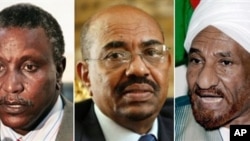A top official of Sudan’s opposition Umma party says its presidential candidate Sadiq al-Mahdi has the principles and vision to unify the people of Sudan.
Fadallah Burma Nasir, the Umma (Community of Islam) party’s vice president, says “our vision is very clear; that is, we are a democratic party [with] certain strategic objectives: to achieve peace…and to transfer [the country] to democracy.”
Sudan has been governed for over 20 years by the National Congress Party led by Omar Hassan al-Bashir.
The NCP came to power after a military coup in 1989 that overthrew al-Mahdi, the country’s last prime minister elected in multi-party polls.
Since then, a comprehensive peace agreement between the SPLM army and the government ended civil war with the south, and paved the way for April’s elections.
They will be followed in 2011 by a referendum to determine whether the south remains part of Sudan or opts for independence. However, sporadic violence continues in Sudan’s western Darfur region where opponents accuse the government of backing militias accused of genocide against civilians.
Nasir said if elected, Umma party leader al-Mahdi will work to bring peace and unify all Sudanese.
“First of all, he is working for the interests of the people…He knows the problems of Sudan, and he is a man of vision. He didn’t commit any mistake or [commit any] wrongs against the people,” Nasir said.
Sadiq al-Mahdi was born in 1935, in Omdurman. He studied economics at the University of Khartoum and at Oxford University in England.
He is an Imam of the Ansar, a Sufi sect that pledges allegiance to Muhammad Ahmad who claimed to be Islam’s savior, or Mahdi.
Al-Mahdi came into political prominence in 1964 in the public debates that led to the eventual overthrow of military leader General Ibrahim Abboud.
He became chairman of the Umma party shortly after democracy was restored.
Two years later, al-Mahdi, 31, became Sudan’s youngest elected prime minister. However, a vote of no confidence brought down his government after only nine months in office.
On May 25, 1969, Colonel Jaafar el-Nimeiry came to power through a coup. He blamed civilians for failing to turn around a declining economy and end years of civil war with the south.
The military government detained al-Mahdi and forced him into exile until he returned to Sudan with a new period of democratization in 1985.
The following year, he was elected again as prime minister. However, he was overthrown in 1989 and placed under house arrest by Brigadier Hassan Ahmed al-Bashir in a bloodless coup. He escaped to neighboring Eritrea where he led opposition to the military government.
After signing an agreement with President al-Bashir’s National Congress Party 10 years ago, al-Mahdi returned home to help strengthen the Umma party within Sudan.




